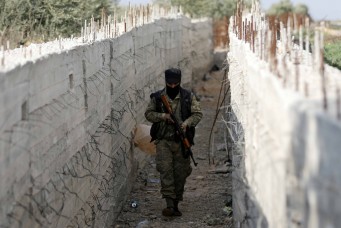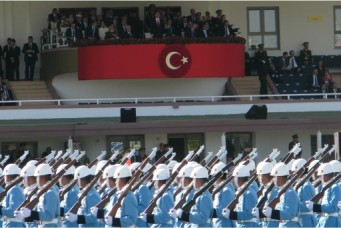The Empire He Did Not Want
Erdoğan wanted to build a “neo-Ottoman” empire but missed out on what is strategically most important—real influence in the Middle East

Turkish President Recep Tayyip Erdoğan, Presidential Palace, Ankara, Oct. 26, 2016. Yasin Bulbul/Anadolu Agency
The most important date in Recep Tayyip Erdoğan’s political career was July 9, 2018. This day marked his inauguration as president of Turkey under the new executive presidential system, which he won in a referendum one year earlier. With power firmly consolidated, the emboldened President Erdoğan should have been celebrating his success with international dignitaries from across Europe and the Middle East whose attendance would have been a reflection of Turkey’s expanded influence.
But not one single NATO member head of state attended. Notably absent also was President Vladimir Putin of Russia, as well as the leaders of Iran and China. The sole representative from the Middle East was from Qatar. Instead of the big names the Turkish president had always sought as partners, the attendees at Erdoğan’s inauguration were leaders from East and West Africa, the Balkans, and the Caucuses. These guests hailed from countries where Turkey’s investments had paid off, making up a new international network yet one that the Turkish leader had never desired. How did this state of affairs happen?
In a recent talk at the American University in Cairo, Soner Cagaptay endeavored to answer this question. Cagaptay leads the Turkish Research Program at The Washington Institute for Near East Policy, and is author of Erdoğan’s Empire: Turkey and the Politics of the Middle East.
Having spent his entire professional career tracking Erdoğan’s political maneuverings, Cagaptay referred to the 2013 Gezi Park protests as the moment during which Erdoğan’s shift to an authoritarian governing style began. Violently dispersed, the Gezi Park protest led to widespread demonstrations against restrictions on freedoms of the press, expression, and assembly, as well as government encroachment on secularism. Gezi Park, explained Cagaptay, became the catalyst for a government crackdown.
Erdoğan’s brand of foreign policy informs his quest for increased Turkish influence, particularly in the Middle East and North Africa (MENA). “Nations that were great empires once have an inflated sense of their heyday,” Cagaptay said, placing current foreign policy in the historical context of Ottoman and twenty-first-century Turkish foreign policy.
In the Middle East, Cagaptay explained that Erdoğan launched a neo-Ottoman foreign policy with the aid of his foreign affairs minister Ahmet Davutoğlu, seeking to capitalize on the opportunities offered by the Arab uprisings. Turkey exclusively backed the Muslim Brotherhood in Egypt, hoping to manufacture allies in Gaza, Libya, and Egypt. The results were disastrous and compounded by Ankara’s support of rival groups in the Syrian opposition. Essentially, Cagaptay explained, Erdoğan wanted to build an empire, but missed out on what is most strategically important—real influence in the MENA region.
In 2016, Erdoğan faced a massive domestic threat as factions within the Turkish military attempted a coup d’état. The anti-Erdoğan military leaders cited governmental assaults on secularism, democratic rule, and human rights. Some analysts regard this event as a ruse orchestrated by Erdoğan to justify his consolidation of power. Cagaptay disagreed, “Ankara was bombed for the first time since 1402. The coup was a genuine attempt.” Following the coup Erdoğan was visibly shaken.
The president emerged from the failed coup embarking on a mission to weaken opposition to his regime, dismissing members of the military, police, and judiciary, and even canceling the passports of dissidents. Additionally, thousands of officials from the education ministry were suspended. The president’s success at these purges culminated in the 2017 constitutional reforms. The changes were dramatic. Turkey’s parliamentary system was replaced with an executive-style presidential system. Erdoğan was not only the head of his party, government, and state, but also of the police and the military.
What happens next? Cagaptay offered potential outcomes, beginning with more of the same. Turkey may continue to leverage the United States and Russia against each other to neutralize the Kurds in Syria. Economic recession in Turkey could shift focus from the government’s actions abroad to domestic matters. Finally, the realities of Turkey’s reliance on foreign direct investment from Europe may force a re-link to the West, despite Erdoğan’s emphasis on Turkey’s cultural and political differences from Europe.
Bungled forays into the Middle East left Erdoğan standing among a small inaugural crowd in Ankara. He is now in a difficult position on the international stage and at home. Referring to the recent Istanbul mayoral race, Cagaptay said, “The opposition came together for the first time in 2018. They won because they were united.”
Erdoğan’s greatest political achievement is the constitutional reform cementing his control over the Turkish state. Yet, Cagaptay stressed at the end of his talk that Erdoğan’s winning the 2023 presidential election, “is not a guarantee”. The new presidential system requires a two-way race with one leader having to win half of the vote. Ironically, if the opposition unites against him, Erdoğan may be undone by the same authoritarian system he has established.
Ross Kimm is a reporter-researcher at the Cairo Review of Global Affairs.
Read More



